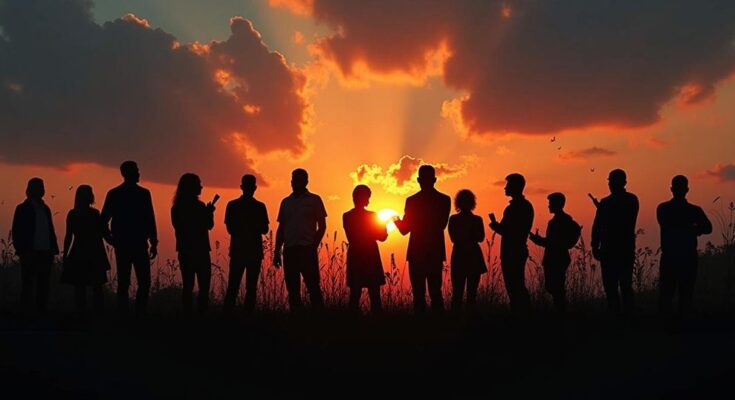On September 26th, UMass students held a vigil in solidarity for victims of crises in the DRC, Sudan, Lebanon, and Palestine. Organizers aimed to raise awareness about humanitarian issues while emphasizing collective action and empathy among participants. Attendees shared personal reflections, highlighting the significance of their united voice against suffering across the world.
On the evening of September 26th, approximately 100 students from the University of Massachusetts Amherst convened on the sidewalk between the Student Union and Campus Pond lawn, united in a vigil dedicated to raising awareness for the ongoing humanitarian crises in the Democratic Republic of the Congo, Sudan, Lebanon, and Palestine. This event, organized collaboratively by the UMass Amherst Students for Justice in Palestine, the Arab Cultural Association, and The African Students Association, was marked by a strong sense of solidarity and collective reflection amidst a light rain. As the conflict in the Democratic Republic of the Congo worsens and Israeli airstrikes escalate in Lebanon, participants voiced concerns regarding the extreme shortages of food, water, medicine, and fuel in Sudan, which has resulted in famine and the dislocation of millions. The situation in Gaza remains dire, noted by the recent declaration from Israeli Prime Minister Benjamin Netanyahu to continue military operations with a pledge for “total victory” against the Palestinian authority while also targeting Hezbollah in Lebanon. Participants sought refuge under umbrellas and trees, and those willing were encouraged to address the assembly. Ridha Alam, a senior biology major and President of the South Asian Student Association at UMass, emphasized the significance of amplifying the voices of the marginalized, stating, “It’s really important for people to go up there and use your voice for the voiceless and really open your hearts. It’s really easy to focus on what makes us so different, but if you think about it, we’re all fundamentally the same.” After several attendees shared their reflections, the atmosphere transformed into intimate discussions, allowing individuals to exchange thoughts on the current events. Senior Maya Glenn articulated her motivation for attending based on prior experiences at similar vigils, noting, “I feel like if we can come out and at least acknowledge what’s happening on campus altogether, maybe it can give us the push to speak out more, to know that we’re a collective.” Highlighting the symbolic location of the vigil, Glenn remarked, “There is power to [where the vigil is located]. This is where the encampment was held, this is where so many students were arrested and brutalized, and then we come here to speak up and share and embrace each other.” A Lebanese student further expanded on the importance of the vigil, emphasizing that it served as a community support system, stating, “No matter what, everyone, in some way, is affected by these [events]. Whether you are ethnically related to these issues… or if you are just empathetic to the cause.” The Lebanese student reinforced the notion that all struggles are interconnected through shared human suffering: “We’re all human at the end of the day, we all bleed the same colors… Even if we’re Palestinian [or Lebanese], wherever we’re from, we’re the same in that we’re one humanity and one people at the end of the day.”
The recent vigil at the University of Massachusetts Amherst was a response to escalating humanitarian crises in several countries, including the Democratic Republic of the Congo, Sudan, Lebanon, and Palestine. In these regions, ongoing conflicts have led to severe shortages of essential resources and significant civilian suffering, prompting student organizations to advocate for awareness and solidarity. This vigil drew attention to the importance of collective action and empathy for those affected by global crises, fostering a sense of unity among participants of diverse backgrounds.
The UMass Amherst vigil served as a poignant reminder of the interconnectedness of global struggles, emphasizing the need for solidarity and collective voice in response to humanitarian crises. Through shared experiences and reflections, students highlighted the importance of acknowledging and supporting marginalized communities, fostering a sense of humanity that transcends individual differences.
Original Source: dailycollegian.com




